Freedom To Create EP 02: Nour
Freedom To Create is our new six-part talk show series, broadcasting live from Refuge Worldwide in Berlin. The bi-monthly episodes will explore themes of identity, migration, and creation through hour-long live interviews curated and moderated by Refuge Worldwide’s Editor, Chloe Lula.
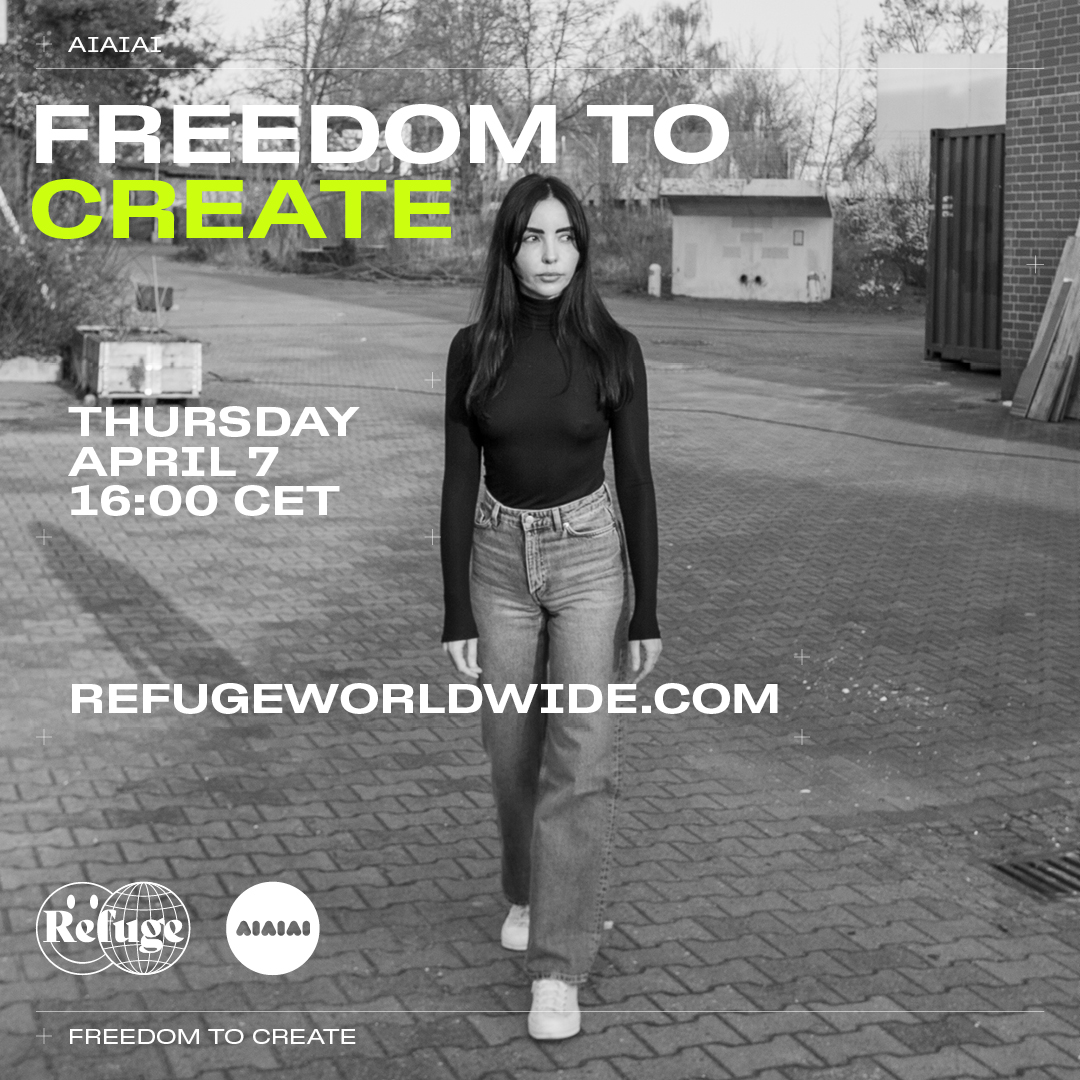
On the second episode of our six-part talk show series, Freedom to Create, Chloe Lula interviews Palestinian artist Nour. Since 2012, the DJ, producer, and documentarian has been living in Tulum, Mexico and DJing as a resident of Papaya Playa, followed by regular appearances at clubs in The Netherlands, Greece, and Ibiza.
She has also released on Talavera Records and Sol Selectas, and is a core contributing member of Future Female Sounds—a femme collective dedicated to teaching women and gender minorities how to DJ and navigate a male-led industry. Recently, Nour began an oral history documentary project in which she is visiting Palestinian refugee camps in Jordan and interviewing the last surviving members of the 1948 Nakba. Thus far, she has collected 90 interviews, all of which she is planning to archive in an ongoing exploration of how displacement and migration has affected the lives of millions of refugees across the Middle East.
Chloe and Nour talk about identity and citizenship, DJing, and being a woman in nightlife. Listen to the episode in the SoundCloud player above, or scroll down to read the entire interview.
Chloe Lula: Thank you so much for speaking with me today. How are you doing?
Nour Palestina: I'm well, a bit tired, but I'm doing well.
CL: What were you doing before this?
NP: I was filming today in a refugee camp. Here in Jordan. I am in Amman right now shooting a documentary focused on the Nakba. So for those of you who don't know, the Nakba in Arabic means “catastrophe.” And it happened in 1948, when the State of Israel was created and the state of Palestine was erased. And what happened back then was over 450 Palestinian villages were depopulated. The villagers were either kicked out or killed. And they all became refugees, the ones that were able to flee, that weren't murdered became refugees, and now residing in refugee camps in neighboring Arab countries. So I've been working on a documentary for the past year documenting their stories, and they're basically getting their testimonies about what's happened, what happened to them in 1948.
As a Palestinian, I feel like this is important to archive all these stories, because this is the last generation who lived the Nakba. And who will recall it firsthand. After then there's not going to be anyone else who experienced the Nakba firsthand and remembers it. And this was such a, this moment in history shaped Palestine to what it is now. And I feel like for future generations, it's important to have all of these oral histories, whether it's through the videos that I do, or the audios or the photos, and just be documenting and getting their side of it. Because unfortunately, there’s another side to it that says it never existed at all. Palestine was a country with no people. A country with no people and people with no land. That's how they used to refer to Palestine back then.
So for me, yeah, I think it's for us as Palestinians, it's important to be documenting all these elders and hearing their story and making sure that their story comes out to the rest of the world, especially for future generations, for future Palestinians. Future generations that are gonna grow up and they're wanting to learn about the history of Palestine.
CL: So you're filming it?
NP: Yeah, I literally go in with my camera. I taught myself. And I'm just like going to the camp, I go into the house, we set up shop and wherever, you know, they're 80-something years old, they can't move very much. So wherever they're sitting in their box house, I go and I sat up there, and I just start filming, I start asking questions. And today I did an interview with an old grandma with her grandkids. So it's like generations, you know, it was interesting. And then they will start crying, like just hearing what they went through. And then it's not like they went through this, but their life is good now. It was just like a consistent battle of them surviving for years, you know, and then you see the future generations who have grown up in these camps because of what happened 74 years ago, and then you can predict what their life is going to be like. So it's just like this continuous cycle of suffering for these people. Like, what's gonna break the cycle? Nothing.
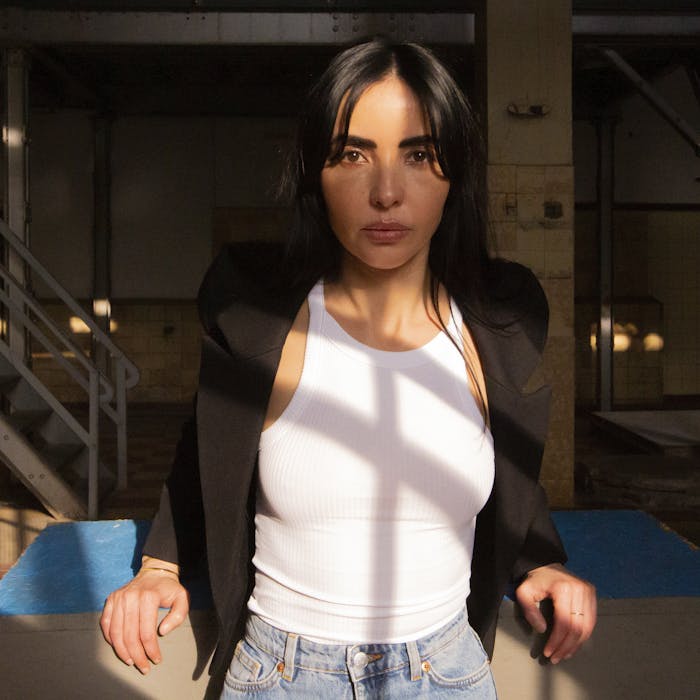
CL: Can you explain a little bit about how Jordan and Amman became the epicenter of the Palestinian refugee crisis, and the criticality of kind of basing this project around Jordan?
NP: Of course, so there's actually 10 Palestinian refugee camps in Jordan. And out of all the Middle Eastern countries that host Palestinians in camps, Jordan has the most camps. One main reason is because it's so close to Palestine. So when the Nakba happened, and people were fleeing Palestine, they were crossing the bridge, because there's a bridge between Jordan and Palestine. They were crossing the bridge on foot and fleeing to Jordan. And Jordan welcomed them and they started hosting them in these camps.
When they first arrived, they were literally just tents. They were living in tents for a few years, until United Nations Relief took over, and they started building houses for them. The reason why Jordan is such as epicenter for Palestinian refugees was because of the distance, because it was so easy for them to flee from Palestine on foot and come to Jordan. And because of the acceptance that they received from the Jordanian King back then. Now Lebanon and Syria also have refugee camps. But they're not as close and they weren't as welcoming to the Palestinians. Not as much as Jordan. Like here, they're able to work, they're able to educate themselves. They're able to get a Jordanian passport. In the camps in Syria and Lebanon, they have no rights. They're like, they're literally they have no nationality. They can't work. They can't go to school. They can only so they can work certain jobs, and they can go to school to a certain grade. And then that's it.
CL: It seems to me just from people I've talked to you since I've been here that even though Jordan is, on paper, very welcoming to Palestinians, there is paradoxically a lot of racism
towards Palestinians, and refugees here face a lot of challenges. Even with getting visas and just the logistical issues of navigating living here. Have you found that to be true?
NP: No, of course. I mean, I've done a lot of interviews where they tell me like so there's two different documents. There's a Jordanian passport and then there's the refugee passport that the refugees get. They don't get a Jordanian passport like any Jordan national would with this passport; you're very limited to what you can do and where you can travel. So they're not recognized as a Jordanian national, but they do have a passport that they can use if they want to travel. But getting a visa on this passport and navigating life, logistically, like you said, is very difficult. So there's definitely racism and there's also racism in what jobs they can do. There's racism, and even just being a Palestinian refugee just like facing racism, everyday racism from everyday people. Definitely, definitely it's here.
But I think compared to other Arab countries that host Palestinian refugees, Jordan is the easiest. But I have, like, even today, I had lunch with this amazing old lady with her grandkids. The grandkids told me, like, one of them studied to be an engineer, but because she's Palestinian, who and she's working as a Palestinian refugee as an engineer, her wage is less than a Jordanian waiter. She went to school to become an engineer and she makes less than a waiter. Because he's Jordanian and she's a Palestinian refugee. So they discriminate, they take advantage. Of course, it's very common, sadly.
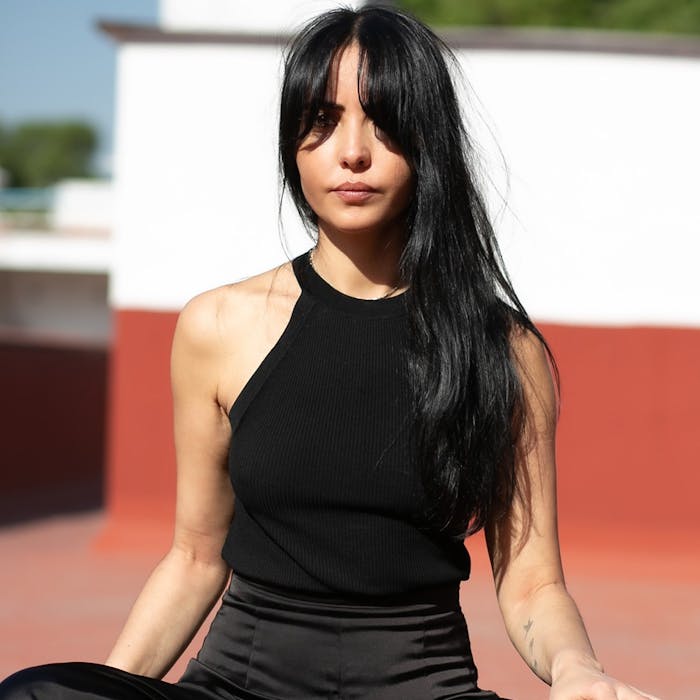
CL: When we first spoke on the phone a couple of months ago, you told me a little bit about the challenging crises around identity and belonging that arise for some Palestinians who are living here and don't feel like they have any distinct homeland, even if they maybe were born and raised here. Could you elaborate on that?
NP: Yeah, yeah, I mean, of course. You know, it's heartbreaking, because one of the questions I always ask is like, what's your dream? You know, when the interviews that I'm doing for this documentary, one last question is like, what's your dream? And every single one of them answers, ‘My dream is to go back to Palestine. My dream is to have a homeland.’ They say, like, ‘I don't have a homeland, I'm a refugee that lives in a refugee camp.’ And they say this thing, which is in Arabic, ‘A person without a homeland is like a donkey without a saddle.’ And it makes more sense in Arabic. But the meaning is like, a person without a homeland is a lost person. And this is what they feel, and this is what they go through. And sadly, you know, this is like, the second generation now of refugees in those camps, third generations and fourth generations. I mean, they've been there for 74 years, you know, now their kids and their kids, kids and their kids are now refugees in these camps, all growing up with no homeland.
So I feel like not having that. belonging and not having that identity just really screws with you mentally almost, you know. I feel like you're just kind of in a constant state of sadness, and you can never really be in peace. Knowing that your destiny is this refugee camp, that I had land back home, I had a farm, they had a house, some of them still have the keys to the houses that they were kicked out of, they hold the keys. And, yeah, it's Sorry, I just, it's very heartbreaking. I mean, especially when they say, ‘My dream is to go and be buried, because they're all in their 80s. Obviously, they're all just wishing just to go home and just be buried in Palestine, just to be buried in their homeland, not to be buried in a refugee camp. So it's yeah, it's a very, it's a very sad thing. And it's something that I feel like, because of it, because they've never been in peace nor happy. I mean, this is what they told me, they've never been, they've never felt at peace.
I mean, I think anyone can relate. Your homeland, where you come from, your identity is so important for you. To not have that and just kind of be like drifting through life in a refugee camp. I'm grateful that I'm a Palestinian, but my family still lives in Palestine. I'm still a Palestinian. We were just one of the lucky ones. But I can imagine what it feels for them. You know, now we're like all dispersed, Palestinians are all over, we make up the biggest in terms of like refugee populations, Palestinians. of anybody. Name a country and you have Palestinians in it. Another thing when I asked them what their dream is, they say, ‘I wish for all the Palestinians to come back to Palestine we live in together, because we were literally like dispersed everywhere all over the world.’ So I think any Palestinian, whether in a camp or not, has that feeling of like longing, of like wanting to go to their homeland. Some live in the United States, some live in Berlin, some live in Australia, some live in Latin America. I mean, they're not necessarily just living in refugee camps, but they have that same feeling of not having a homeland. You know, for some are luckier than others because they're not stuck in refugee camps.
CL: Is the project that you're working on right now the first time that you've done a documentary?
NP: Yeah, definitely. It's the first documentary and I feel like what got me into it was because I've lived outside for so many years, you know, I live in Mexico, I'm based in Mexico, but then I've also lived in Canada. I've lived in Europe. I haven't lived in Palestine since I was 15. I go back all the time. But because I've been so exposed to the outside world and I see like what the what the what they think what Palestine is and is the whole conflict in Palestine what happened? I realized that the majority of people outside of the Middle East don't understand the history of what Palestine is and how how we got here today, including my own friends who really have no idea, and they would ask me all these questions and in my head I'm like, ‘How do you not know this?’ But I understand, because this was never taught in their school, this was never taught in the Western world, and this was never spoken about.
So this last May, if you recall, there was a big war in Palestine. I would post about it and they would make comments like, they would not understand the context of what my posts were about, you know, and when I would make posts about the people being kicked out in the last 74 years, this is not new. This is happening all over again, it's a repeat of it. And I would post about, you know, old articles about the Nakba photos, and just talk about it, and no one really no one knew. I was just like, I need to do something about this. I need to educate people about this, I need to educate the world. And we need to have this as proof for our own purpose, almost like our way to show what really happened using testimonies from these elders who really experienced it. So I just went and bought a camera and just started going to these camps and taking these interviews.
I've collected over 90 interviews so far. And I feel like obviously, I can't use them all in a documentary, because that would be way too many interviews. But my plan is to have them as an archive. But what made me want to do it was really just last flare up in May. They've gotten no attention. And I feel like, you know, as a Palestinian, like, if we have the tools, the power and the platform, we have to do something for the ones who can't.
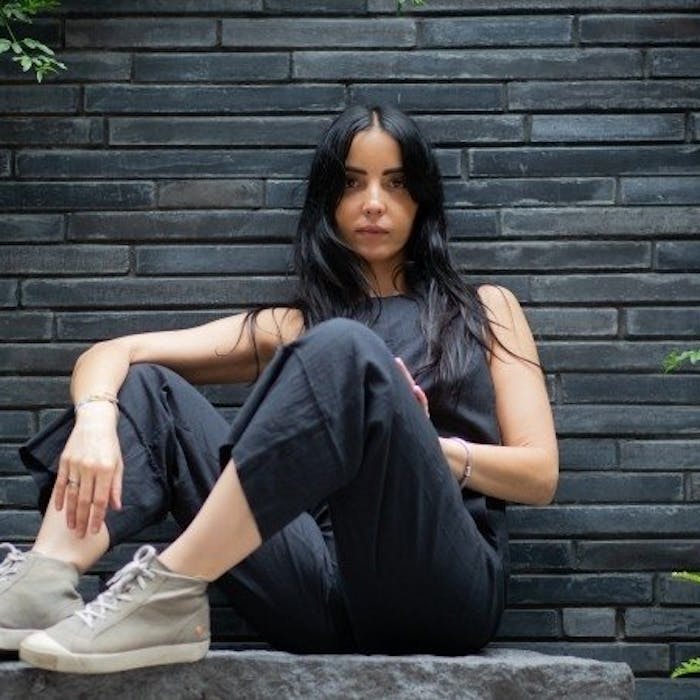
CL: I think it's so important that you're creating an archive. Archives are really powerful, you know, when you're looking back in history, and even just seeing who has control over archives, and the narrative that the archive depicts. All of the history you’re capturing would have been completely lost otherwise.
NP: Exactly. It's important. Yeah, just you know, just because also, like, there are different people who try to change history. We've all as Palestinians come across people who are trying to hate change the history of what happened to the Palestinian people, and can completely manipulate it. So we need to have this as proof. It's important for us.
CL: So beyond your work with this documentary, are you involved in any other projects that platform Palestinian voices, in your work with music or otherwise?
NP: Yeah, I mean, the person, actually, the person who's doing the music for this documentary is a Palestinian composer from Guatemala. And she's amazing. So I am working with her. But in addition to that I just finished a track with an amazing musician. His name is Ibrahim. And he lives in a refugee camp in Bethlehem. He has an amazing voice. So we worked together on a track a couple years ago, and it's going to be released this June on Soul Selectas. I do have the opportunity to reach these big labels and I like to collaborate with musicians in Palestine that maybe don't have that. So just so we can get their name out there as well. I feel like that's important. And plus, they're just so talented. Like, it's not even just because I want to, I need to because they're so talented. There's amazing talent coming out of Palestine. But unfortunately, because of where they are and what passport they hold, they don't get the opportunity to excel beyond a certain point. So again, myself, you know, holding a Canadian passport and being able to travel freely and have contacts all over the scene, I try to do what I can in any way that I can. I think it's important.
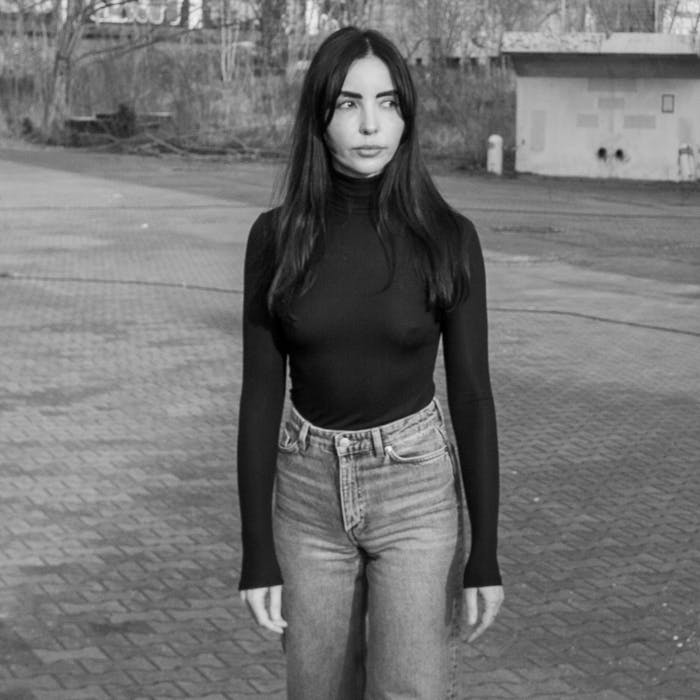
CL: I want to switch gears a little bit into music. You've had a really successful career as a DJ and a producer. How has this side of your creative life evolved up until now and how are you balancing it with the documentary?
NP: Yeah. Yeah, it's interesting because I get a lot of bookings. But I've just been saying no, just because my focus is so much on this documentary right now. I don't want to keep traveling, I don't want to go to gigs. I don't want to stay up late night unless it has something to do with this doc right now. I am playing in Amman on Thursday night. But that just worked out perfect because I'm here shooting and I was offered this gig. It's interesting, like trying to find that balance. My passion right now is getting this documentary. That's kind of where my heart is right now, in my mind, and where my motivation is.
CL: I can definitely relate as someone who's a journalist and a DJ and producer. It's been difficult to balance both at the same time. Your focus kind of switches between one or the other. Yeah,
NP: I mean, you just have to follow what's motivating you at that moment. Right? Like, what's exciting you? Where are your creative juices going? You know, because also like, if I'm so focused on the documentary, but I need to go DJ all the time, I'm not going to be happy. And for me when I'm not happy. I'm not as creative. I just become unhappy.
CL: How did you start getting into DJing?
NP: Oh, that's actually interesting. Because how I started with DJing was I was making playlists, do you remember iPods? So I was making playlists for like, hotels in Mexico, and like bars and beach clubs, and they would give me their iPods. And I would like, fill it up, I would go to the venue or the beach club, where the restaurant would hang out and like, feel the vibe and like, fill their, their iPod with music and they would pay me, you know, per hour of music or playlist depending what deal I had. But that's kind of how it started. I was always collecting new music, I just love music. And then I was also very in the DJ scene, not as a DJ, but more as a partier. You know, all my friends were DJs or promoters or bookers. So I was super in the scene. But I was never a DJ, I just did the music programming.
But then after parties I started to DJ, because I would always have USBs, obviously, and have music on me as well. Or just DJing my friends music and just kind of getting into it very organically. You know, it was never like I wanted to be a DJ. It was like it started off with just having good taste and music. And then it started off with, like, DJing random gigs at random after parties. And then friends in the scene would start teaching me how to beatmatch better. And I once I learned how to use the CDJs, I was like, ‘Ah, love this. This is fun.’ And then like playing my own music and like learning how to make some and tell a story with a whole set. It just got so exciting. It just kind of happened like this organically. And because I think I already had such a huge collection, I was able to read the room, right? I was able to get gigs even though my mixing wasn't on point yet. back then. But I had really good music, I was able to read the room. I started to get gigs, and good gigs. I would open for pretty big names back then. And it just kind of flourished and went from there. I love music. I love it. And I think DJing was an outlet for me to get the music out there.
CL: So I know you're a member of Future Female Sounds, which is an all-female nonprofit organization that aims to empower girls through sound and action, and to make DJ culture accessible to women and gender minorities around the world. Can you describe the origins of the project and your involvement with it up until now?
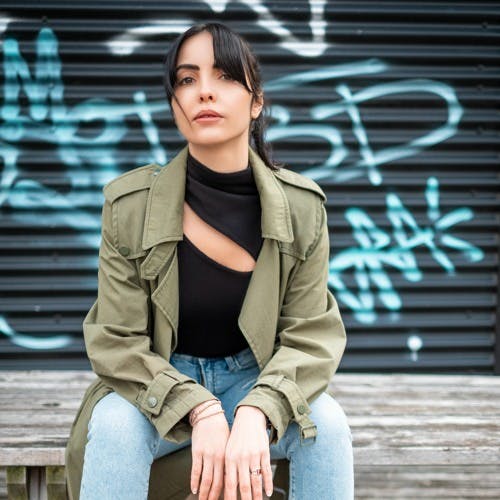
NP: Yeah, of course. We just had an amazing workshop in Berlin. And you know, two of the girls, one of them was from Egypt, and one of them was from Syria. At the end, they were like, ‘This is a life changing experience.’ And it was just amazing, you know, for them to say that. The founder of FFS is a DJ. She's always been in the scene. And I feel like she got tired of it being such a male-dominated industry and having women overlooked just because they were women, you know, they could be just as talented as a man. But because they were women, maybe we're not getting as much attention or exposure or gigs. And I think I know that what she wanted to do was change, that she wanted to take control of the industry for the women, and kind of create a safe space for them. She has her own agency now, Future Female Sounds. There's an agency where she represents different females from all over. And I think, yeah, her main goal was just to kind of empower them and give them a safe space.
It can also be very intimidating for women in this business. And I'm sure you know. So that's kind of how it all started.Now, you know, she's representing all these women DJs and supporting up-and-coming DJs, minorities, migrants, women of color, just kind of support them and give them not only the technical support of DJing, because that's what the workshop involves, but also the emotional support and just answer any questions that they may have about being a woman and navigating that male dominated industry, I had got a residency in a beach club in Tulum called Papaya Playa. I remember, there were two of us, it was myself, I was one of the resident DJs, and another male DJ. And he would always get the better slots, you know, when we would have the full moon parties. And he was always getting his name bigger on the flyer, you know, or just little things like that. But I was just like, we were both the residents, like we both were paid the same. We both had the same skills. You know, this was later when I had developed my skills. I don't think he had better taste in music. Nevertheless, you know, it's a subjective opinion. Some people might have liked his music more, some people might have liked mine more. But I remember like, he was always like, you know, being supported more by the venue than I was. And it just bothered me so much. But I remember not having anyone to talk to. Am I gonna go tell the manager who is also another male? I just took it. How should I handle the situation? What should I say, rather than just having to take it for two and a half years?
CL: I've only been here for a few days, but it seems that there are not a ton of women involved in the scene here. And you're actually, I think, the only woman I've interviewed so far. But it just seems like a really male-dominated scene.
NP: Definitely. And, I mean, you have to remember it's the Middle East, right? Yeah. I mean, I don't like to admit it, but we are still in the Middle East, unfortunately, and women are not as recognized as men are in any industry, not just the music industry. And there's still this like old fashioned mentality here in the Middle East of like, a man is more powerful, a man stronger, a man should lead. I'm sure it's not as bad as my parents' generation or my grandparents’, it's definitely a lot better. But that still kind of exists. So I think maybe that intimidates women from being more open and comfortable with themselves to be in the scene. But even one thing I noticed is like, when you compare Jordan to Palestine, Palestine has more women in the scene. Palestine is still more liberal and open with women than Jordan, which is very interesting.
There's not as many women here, and I really feel just because they're not as confident because they were never really given that safe. And they're judged here a lot by their community, by their family, by their friends, you know, they don't get as much support as they would anywhere else. You know, they might get called something that's not very nice, because they're at night clubs at night, by their society, by their neighbours. So they have to tiptoe around.
CL: What would you like to see change in the Amman scene in general?
NP: Less bottle service. Definitely, like more underground. There's a lot of bottle service places here. You know, I feel like I understand, you know, as a venue owner, like, that's how you make your money. But I feel like there's not enough spaces for the underground scene. Because most people who do underground parties here have to, like find a space or a venue. It's not like there's one consistent venue, or you could find one every Friday night. They have to find a special venue to do this one off party. But normally, if you're going out every weekend, it's like one style of party and it's kind of little top 40 music, the bottle service tables. So I wish that would change. I also wish there were more safe spaces for women to be out in the scene. I wish it was more controlled by women. I wish there were more women DJs, women promoters, women venue owners, just more presence of women in the scene. I feel like we're really missing that.
CL: I guess just briefly like touching back on your music and DJing, what kind of stuff have you been really gravitating towards musically recently? What's exciting to you?
NP: So I you know, I think as a Middle Eastern, I love Middle Eastern music. I love it. I love our instruments. I love our keys. I love everything about it. But I also love mixing it with electronic music. You know, I love that world of music. Have you heard of Muqata’a?
So I go through weird phases of like, you know, when I'm producing, it's pretty electronic, but I also love listening to hip-hop. And I love listening to Palestinian hip-hop, because if you can understand what they're saying, he words are so powerful. So I've been really like gravitating, I think because I've also been working on this documentary and I need that kind of thing to give me that .. like, we're doing this for a cause. I’ve been listening to a lot of Palestinian hip-hop, including Muqata’a. I've been really getting really inspired by their lyrics.
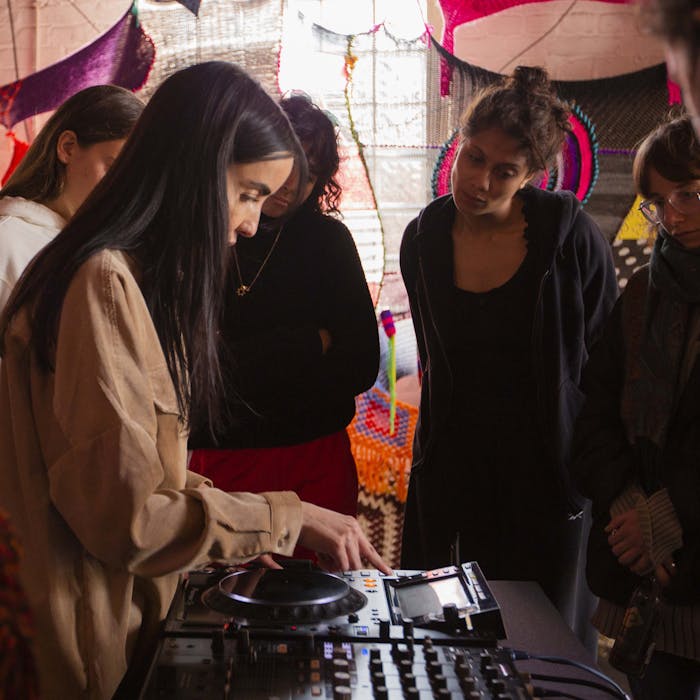
CL: My understanding is that he kind of pulls from this glitch feminism, and he uses different kinds of glitchy experimental techniques as a way of disrupting social political narratives. I find that super interesting.
NP: It's true. Yeah, he definitely does have that style. Like he goes to Ramallah and just starts recording downtown, people like yelling and screaming and like just different sounds of Ramallah, and then like he goes into a studio and just makes it sound amazing. And I feel like as a Palestinian you can relate because you'll hear these sounds, like of the of the guy that's selling bread that you always remember the sound of him walking through the streets of your neighborhood, calling for bread. Or the call of prayer, or the guy in Ramadan that walks around the streets waking people up for this food. We wake up before the sunrise to eat and go back to bed. And back home there's a guy here in the Middle Eastern countries that goes through the
neighborhood and wakes these people up with a bell. It's amazing. I mean, he recorded this once and made an amazing track from it. So it's like it's very nostalgic. It is just like these experimental sounds that maybe anybody not from Palestine would get but for us.
CL: What else are you working on right now? What else do you have coming up that people should look out for, with your music or with anything else?
NP: Yeah, I mean, I have the release of that track on Soul Selectas. I'm also working with Refuge Worldwide and Seven Hills skatepark. We're conducting three weeks of DJ workshops, radio, hosting workshops, documentary workshops, just different creative workshops that myself and other artists here from the Middle East and elsewhere will be hosting, including Nicholas Jaar, which I'm a huge fan of
CL: Is there anything else that I missed that you want to add?
NP: No. Free Palestine!
CL: Thank you so much for joining me today. It's been great speaking with you, and I'm really looking forward to watching the documentary.
NP: Yes, I'm looking forward to sharing it. Thank you for taking the time to speak to me as well.
CL: That concludes my interview with Nour Palestina. The remainder of the show is a mix of Nour’s own productions, including a few unreleased tracks of hers that will be out later this year. The next episode of AIAIAI’s Freedom to Create show will be out in early June. Thanks for joining me, I'll see you next time.
Posted on May 10, 2022 in Community